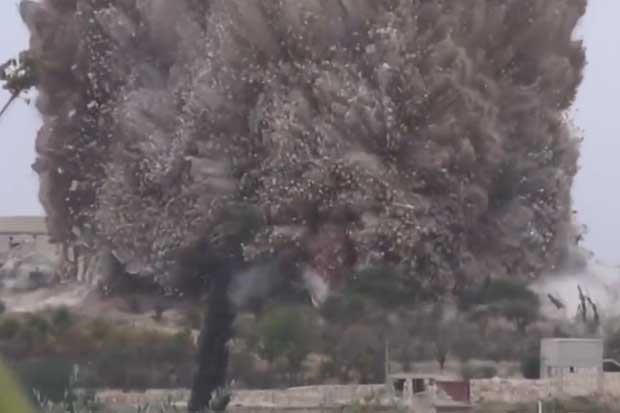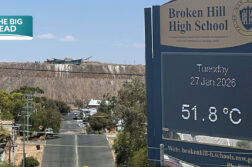Back in the 1970s, Noam Chomsky and Edward Herman published a two volume study, the Political Economy of Human Rights. Their arguments were further developed in Manufacturing Consent: The Political Economy of the Mass Media.
They argued that as a result of factors like the concentrated corporate ownership of the media, and the need to appeal to wealthy advertisers for funding, the result were various institutional filters on the mass media. These filters narrowed what could be discussed in major media outlets, and the way in which those issues would be framed and so on.
As a central illustration of their thesis, they compared how war crimes and atrocities were treated in various countries. In states that opposed US interests, any scrap of evidence that could be used to show enemy perfidy would be eagerly seized on and amplified, even when that evidence was shown to be false. Conversely, mountains of evidence showing atrocities committed by allies of the US would be overwhelmingly ignored or downplayed. Within the limits of the propaganda interests of the US government, journalists could be brave, honest and display other qualities, but once they strayed too far from firmly set limits, one or other filter would usually manage to weed them out of the major media.
Across the spectrum of major media outlets, this thesis receives constant confirmation. As one example, there was the Arab uprisings. Most uprisings were against Western backed dictatorships – in countries like Egypt, Tunisia, Bahrain, Jordan and Yemen. However, there were also uprisings against the dictatorships of Syria and Libya. A Fairfax article noted in passing the reality about Australian foreign policy: “The uprising in Syria has followed a similar wave of protests against despots across the Middle East that led to dictators being toppled in Tunisia and Egypt, along with ongoing protests in Bahrain. The former foreign affairs minister Kevin Rudd had taken a strong stance against brutality by the Syrian regime”.
That is – after a wave of uprisings against dictatorships, there was polite acknowledgement that Australia supported one of those uprisings. In the blog I wrote at Overland, I reported that Rudd proudly explained, “We rely very much on our friends in Bahrain”, and the benefits of “the strength and depth and breadth of the diplomatic relationship” between Australia and the Gulf States. On 8 March 2011, less than a month after the uprising in Bahrain began, Australia took part in the inaugural Gulf Cooperation Council-Australia Foreign Ministers Strategic Dialogue, which was to expand cooperation between Australia and the Gulf States.
Given Australia’s close ties with Bahrain, one would hope that Australian media would pay closer attention to what happens in Bahrain than Syria, as our government has more influence over what happens in Bahrain. Chomsky and Herman’s propaganda model, however, would predict the opposite. So what do the facts show?
As I reviewed at Overland, in June 2012, Ruth Pollard, the Fairfax Middle East correspondent, had mentioned Bahrain twice. Once was in a sentence which included the words “the bloodshed continues in the uprising in the tiny Gulf state of Bahrain.” And in an article on 17 December 2011, which ran to over 3,500 words, the article ended with a capsule summary of events in various countries, including Bahrain.

Around the same time I reviewed media coverage of Syria, which I thought was marked by a loyalty to serving the interests of the Australian government. All allegations against Assad were taken at face value and assumed true, whilst evidence of war crimes of the Syrian rebels was typically ignored. Favourable coverage was given to rebels amenable to Western interests, such as the Free Syrian Army, whilst anti-intervention left-wing activists like Haytham Manna were ignored.
With this in mind, I wanted to revisit the case of Ruth Pollard. Not because she’s a terrible journalist. I think her reporting has improved in recent years: she has shown markedly more independence in covering the Israeli-Palestinian conflict. I chose to examine her reporting because Fairfax does not take, and is not known, for observing the right-wing slant that people expect from the Murdoch press.
Pollard’s latest article on Syria was published on 9 May. She claimed that the advances of a “new coalition of opposition groups” has “shaken” the Assad government. This coalition was “backed by the powerful regional alliance of Turkey, Qatar and Saudi Arabia”.
Pollard’s primary source for her faith in the impending fall of Assad was “Mario Abou Zeid, a research analyst with the Carnegie Middle East Centre”. Abou Zeid explained that the newly formed umbrella of opposition groups, the “Army of Conquest” was having “tremendous success”. This group has “the Nusra Front as its main pillar and surrounded by the remnants of the Free Syrian Army as well as groups such as Ahrar al-Sham, Jaish al-Islam and others”. Remember that the Nusra Front is the official branch of al Qaeda in Syria. The “others” is a polite way of saying other Bin Ladenite groups – like Ahrar al-Sham, which was co-founded by Abu Khalid al-Suri, who acted as a representative of al Qaeda in Syria, with which he had close ties, as shown in the eulogy they gave him after his death.
Pollard’s story continued: In Qalamoun, there is a “a three-sided conflict – on one side are the Nusra Front and its allies backed by Qatar, Turkey and Saudi Arabia, on the second side are Hezbollah, the Syrian regime and Iran and on the third side is the so-called Islamic State”. Pollard wrote that “The key player on the Qalamoun front is still the Nusra Front, along with its allies from the remnants of the Free Syrian Army, Mr Abou Zeid said.”
Remember: the US has long been committed to supporting allegedly moderate Syrian rebels, though in January, since the rise of ISIS, it began cutting off aid to some of these groups. The US still supports the Free Syrian Army, which Pollard reports is part of an alliance with Bin Ladenite groups. It appears being part of that coalition didn’t seem to trouble her too deeply, or cause Pollard to investigate let alone comment any further.
Pollard quoted another analyst claiming that the “psychological scales” are now in “the opposition’s favour”, but the major source for her belief in the imminent fall of Assad seemed to be Abou Zeid. Readers may be unfamiliar with him – he is not widely published, but he has written two articles for al Jazeera. One was published May 11, two days after Pollard’s article. In his article, Abou Zeid claimed that Assad and Hezbollah have suffered “significant losses”, anticipating trouble for them both.
Readers may feel entitled to some scepticism, given that we have heard more reports of the imminent demise of Assad in the last few years than we used to hear of the imminent victory of Western forces in Iraq. For anyone doubting the judgment of Abou Zeid, he explains in his article that the battle “has exposed the reality of the Islamic State of Iraq and the Levant (ISIL) in Qalamoun; that it is operated by the Syrian regime's intelligence.” How does he know this? For this amazing revelation, he mentions in passing in one paragraph that his theory is “Based on my own field research”, and his own creative reading of the rhetoric of US Secretary of State, John Kerry.

In short, Pollard selected a rather… unique “expert” to turn to for insightful analysis on Syria. That Pollard’s preferred analyst thinks ISIS is “operated” by Syrian intelligence shows us how much insight she has on Syrian politics. That no-one has picked up on this shows the complete absence of intellectual standards in commentary and analysis on Syria.
Other US officials have been a little more honest about the rise of ISIS. President Obama admitted that “ISIL is direct outgrowth of Al-Qaida in Iraq which grew out of our invasion”. Vice-President Joe Biden complained that America’s allies – Turkey, the United Arab Emirates and Saudi Arabia – were the US’s “biggest problem” in Syria. "What did they do? They poured hundreds of millions of dollars and thousands of tons of weapons into anyone who would fight against Assad – except that the people who were being supplied were Al-Nusra and Al-Qaida and the extremist elements of jihadis coming from other parts of the world”.
That is, the coalition that Pollard and Abou Zeid seem to welcome as bringing the supposedly imminent fall of Assad.
Abou Zeid’s strange theory may seem preposterous to people who know a little of the region and aren’t fanatically devoted to this or that side. However, by the standards of Al Jazeera, he is not particularly extreme. Al Jazeera ran a TV program where the host and one of his guests attacked Alawites in the most despicable terms, and repeatedly called for the extermination of Alawites in Syria. Lebanese-American political scientist As’ad AbuKhalil strongly condemned the program, but it has otherwise passed largely unnoticed.
One can find other signs of standards being abandoned in Western commentary on Syria. The head of Human Rights Watch, Kenneth Roth, wrote a tweet “It really is this bad”, with a video showing the horrors of “what Assad’s barrel bombs have done to Aleppo” and the immense destruction wrought.
I stand corrected: this is video of Gaza destruction after last summer, not Aleppo. Telling. http://t.co/i8lni23MqD pic.twitter.com/eEXUVx6Cmc
— Kenneth Roth (@KenRoth) May 9, 2015
As it happens, the video was actually of the destruction in Gaza. At the time, Kenneth Roth wasn’t quite so unequivocal in his denunciation and horror.
All of this will be familiar and even predictable to those who have read the work of Chomsky and Herman. By now, the patterns are so consistent their work seems almost mundane.
As they would have predicted, serious coverage of an enemy state in the Middle East is unlikely to emerge from the corporate media: people who would like reliable information would be best advised to search elsewhere.
Donate To New Matilda
New Matilda is a small, independent media outlet. We survive through reader contributions, and never losing a lawsuit. If you got something from this article, giving something back helps us to continue speaking truth to power. Every little bit counts.



